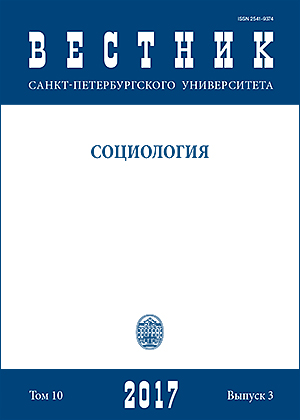THE CASE OF MEMORY STUDIES: STUDENTS REMEMBERING 1993
DOI:
https://doi.org/10.21638/10.21638/11701/spbu12.2017.304Abstract
Despite the fact that the events of the early 1990s played a crucial role in shaping the social, political and cultural spheres in Russian Federation that embarked on the path of the democratic and capitalist development, this seldom falls into the focus of modern sociological research. In particular, this concerns issues of memory and, as a consequence, historical images that form national identity. In this article we turn to the classical theory of memory by Maurice Halbwachs, as well as to the works by Michel Foucault. Thus, the key concepts of our research are “memory” and “counter-memory”. Within the framework of our research, the analysis of the formation processes of the historical memory of modern students about the events of 1993, in particular — the Putsch, was conducted. The study involved technical students and humanities at the age of 17 to 22 from two universities in St. Petersburg. The study included 3 parts: an online survey (200 participants); unstructured personal interview (12 participants); content analysis of media (TV and 36 newspapers) and federal textbooks on the history of Russia for 2013–2014. Based on the content analysis, we found out that the interpretation of events in the mass media contradicts its legal version. The image of Boris Yeltsin as a central person prevailed in all analyzed sources, while his opponents are hardly mentioned. The events that occurred in 1993 were almost ignored by Russian history textbooks. This is how the “insignificance” of these events was formed. The results of the survey and interviews were similar. Thus, it can be argued that, at the moment, a fairly tough historical policy is being pursued in Russia, including the events of 1993.
Keywords:
memory, counter-memory, 1993, putsch, historical policy, memory design, survey, content analysis, generational analysis
Downloads
References
References
Downloads
Published
How to Cite
Issue
Section
License
Articles of "Vestnik of Saint Petersburg University. Sociology" are open access distributed under the terms of the License Agreement with Saint Petersburg State University, which permits to the authors unrestricted distribution and self-archiving free of charge.




